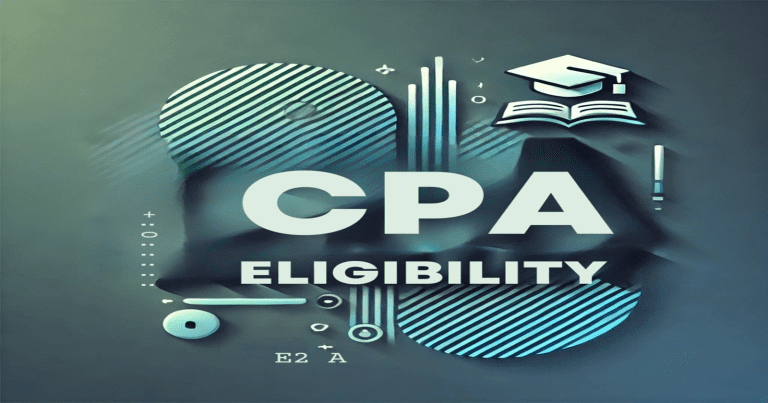CPA is one of the best certifications that speaks about one’s mastery of accounting, auditing, taxation, and business laws. It’s a certification of the American Institute of Certified Public Accountants, with a worldwide acceptance, one of the most distinguished titles in accounting. Eligibility for becoming a Certified Public Accountant (CPA) involves meeting specific educational and professional criteria, such as attaining a degree in accounting or related fields, completing credit hour requirements, and passing the rigorous CPA examination administered by authorized boards.You would want to go into auditing or taxation or perhaps financial consulting- the CPA label is a big differentiator when it comes to career opportunities and professional recognition. The certification is achieved after a candidate has passed a rigorous eligibility process. It is essential to know these requirements to chart your CPA journey and ensure you meet the standards set by regulatory authorities.
What is CPA?
Certified Public Accountants (CPA) hold an elite designative name that sets an accounting and finance world. Being a professional title, it isn’t a certification; rather it affirms an area of special proficiency in fields that include auditing, taxation, financial planning, regulatory compliance, or other specific industries. The AICPA is the issuing body for the CPA USA certification, which is globally recognized. However, it means more than just a certificate it signifies a solid grasp of financial systems and a person’s ability to apply accounting principles well. CPAs may not be simply reduced to traditional bookkeeping or accountancy roles alone but their expertise extends to advisory, management, and leadership positions in organizations.
One of the most important aspects related to becoming a CPA is the Uniform CPA Examination, which is very broad in scope and rigorous in nature. To become a certified CPA, one needs to pass this exam along with other demands such as education and work experience, which ensures that the professional employee meets high standards in ethics as well as in the technical world.
CPA Eligibility in India
The CPA certification is not limited to candidates from the United States. Indian professionals increasingly pursue this credential to gain an edge in global markets. The eligibility criteria, though aligned with U.S. standards, are available to candidates worldwide. For Indian aspirants, there are specific academic, examination, and experience requirements for qualification.
Compared with other certifications, eligibility to acquire a CPA in India may require serious planning regarding U.S. state boards’ requirements to use the US CPA qualification. Such requirements are monitored under the jurisdiction of the U.S. state board, and individual rules slightly change for foreigners. Thus, aspirants approach professional agencies, or the sources provided by AICPA.
Preparing to fill in the gaps in education when being an Indian candidate meets the eligibility criteria. For instance, all the U.S. boards require a minimum of 150 credit hours, which is generally more than the credit hours received from a normal bachelor’s degree under the Indian system. This oftentimes requires more education, such as completing a master’s degree, or professional accounting courses like CA or MBA.
Educational Requirements
The educational prerequisites form the foundation of CPA eligibility. Candidates must meet the following.
- A bachelor’s degree in accounting, finance, or any related field is required. Indian bachelor’s programs typically last three years and are usually not considered complete for credit hour requirements set by U.S. state boards of 120 to 150 hours.
- Additional qualifications, such as a master’s degree or a CA designation, fill in some of the gaps in credits. The CA is often very satisfactory in fulfilling much of the credit requirement, which makes Indian CAs a particularly strong candidate for CPA certification.
- For most applicants, knowing their Indian qualifications will be equivalent to U.S. standards is the first step. This requires the translation of academic credentials into the semester hours needed by the U.S. system.
Exam Criteria
The Uniform CPA Examination is a standardized test every candidate for the CPA must pass. It has four sections, which test different competencies. There are books available in the market for the courses.
- Auditing and Attestation (AUD): It includes knowledge of audit procedures, ethics, and professional responsibilities.
- Business Environment and Concepts (BEC): The examination of knowledge about business operations, financial management, and decision-making.
- Financial Accounting and Reporting (FAR): Examines the knowledge about financial statements, reporting standards, and governmental accounting.
Regulation (REG)
Tests knowledge about U.S. taxation, business law, and ethics.
- Every module takes four hours and, hence, is lengthy. It is a challenging examination as its passing percentage often runs below 50%. One must clear all modules within an 18-month rolling time frame.
- Knowledge of US tax laws and business regulations would require some getting accustomed for an Indian candidate. With a rich body of study material and various review courses, there are always many CPA’s at your doorstep.
Jurisdictional Requirements
Each state board in the United States has different rules in awarding CPA eligibility. Indian contenders need to choose their preferred state with criteria that will match their qualifications. For instance, some states are easy-going while awarding the educational credit hour requirement while others are hard after prerequisites. Knowing the rules of your preferred state is very essential because these state boards also dictate the exam requirements, such as several working experiences needed to become a CPA.
Work Experience
Work experience requirements differ from state to state, but most boards require candidates to work under a licensed CPA for one to three years. This will ensure that the candidate gets hands-on exposure to the practical aspects of accounting and auditing. For Indian candidates, this requirement may be fulfilled by working with multinational firms or U.S.-based organizations with CPA-certified professionals.
Exam Pattern of the CPA Exam
The Uniform CPA Examination has a unique structure geared towards testing technical knowledge and applied skills. It comes in multiple-choice questions, task-based simulations, and written communications tasks.
Each component of the test is further segregated as follows:
- Multiple Choice Questions (MCQs): Evaluate basic concepts in the related section.
- Task-Based Simulations (TBS): Involves practical experience situations that will call for analytical ability and problem-solving.
- Written Communication Tasks: Features in the BEC, tests the candidate to express the concept of finance.
- The format of the examination makes the candidates not only aware but also the ones who could apply knowledge in practical fields.
CPA Course Fees
To become a certified CPA is costly. Budgeting should be done before seeking this professional training. Costs that should be expected include the fee for applying for the program, registration of an examination, the study material, and the licensing fee. The actual cost of certification for a CPA is an investment toward one’s professional future. The cost of pursuing the CPA certification can vary based on several factors such as the U.S. state board chosen, the study materials used, and additional requirements like international testing fees.
| Component | Approximate Cost (INR) |
| Application Fee | ₹8,000 – ₹25,000 |
| Examination Fee (All Sections) | ₹65,000 – ₹85,000 |
| Ethics Exam Fee | ₹12,000 – ₹17,000 |
| Study Materials | ₹85,000 – ₹2,50,000 |
CPA Salary in India
The power of the credential to increase potential earnings is vast, especially in India. People with a high demand for it are found within industries like auditing, financial planning, as well as in taxation.
- Trends in Salary- The entry-level CPAs from India earn about ₹6,00,000 to ₹9,00,000 in a year.
- With middle-level experience, salaries increase from ₹12,00,000 to ₹20,00,000.
- Senior CPAs and managerial positions can command more than ₹20,00,000 pa.
- This salary range reflects the worth organizations attach to the CPA certification and the expertise it embodies.
CPA Certification: A Career Catalyst
Earning the US CPA certification is not just about meeting eligibility criteria or passing exams; it represents a mark of distinction in the global financial landscape. The CPA credential signifies expertise in accounting, taxation, auditing, and financial management, setting professionals apart in a competitive job market. It opens doors to diverse roles, from financial analysis and risk management to strategic consulting and executive leadership in multinational corporations.
CPAs are trusted advisors who help businesses navigate complex financial regulations, optimize tax strategies, and ensure transparency in financial reporting. Their skills are in high demand across industries like public accounting, corporate finance, government, education, and non-profit organizations.
Moreover, the CPA certification offers global recognition, making it easier for professionals to work in different countries, including the U.S., Canada, the Middle East, and India. For Indian professionals, the CPA designation enhances career prospects in global firms and boosts earning potential significantly.
With rapid globalization and increased focus on financial integrity, CPAs are not only financial experts but also strategic partners in organizational growth. Whether it’s spearheading mergers, managing financial risks, or advising on investment decisions, CPAs are integral to shaping the financial future of businesses.
Earning a CPA means joining a network of elite professionals who command respect, enjoy career stability, and have access to leadership opportunities worldwide. It’s a credential that reflects not just knowledge but also a commitment to excellence and continuous professional growth.
CPA Eligibility FAQs
What are the educational requirements for being eligible for CPA?
CPA eligibility requires a bachelor’s degree and 120 to 150 credit hours of post-secondary education, depending on the U.S. state board.
Can Indian CAs pursue CPA certification?
Yes, Indian CAs often meet many CPA requirements and can leverage their qualifications to fulfill credit hour and experience prerequisites.
What is the CPA certification, and who awards it?
The CPA (Certified Public Accountant) certification is a globally recognized credential awarded by the American Institute of Certified Public Accountants (AICPA).
What is the eligibility for CPA certification in India?
To be eligible, candidates must have a bachelor’s degree and 120-150 credit hours of education (varies by state). Additional qualifications like CA, CS, or an MBA can help fulfill the requirements.
Why is a CPA certification important?
A CPA is globally recognized, has increased earning power, and has expertise in accounting, auditing, and financial management.


